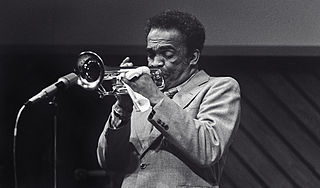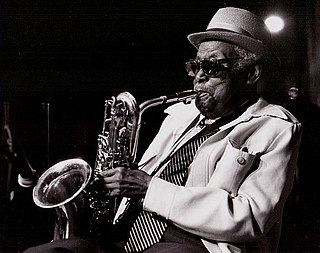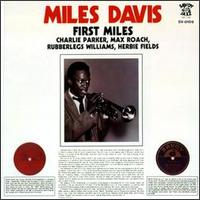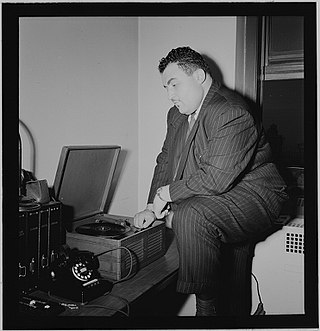Related Research Articles

Bebop or bop is a style of jazz developed in the early-to-mid-1940s in the United States. The style features compositions characterized by a fast tempo, complex chord progressions with rapid chord changes and numerous changes of key, instrumental virtuosity, and improvisation based on a combination of harmonic structure, the use of scales and occasional references to the melody.

Charles Parker Jr., nicknamed "Bird" or "Yardbird", was an American jazz saxophonist, band leader and composer. Parker was a highly influential soloist and leading figure in the development of bebop, a form of jazz characterized by fast tempos, virtuosic technique, and advanced harmonies. Parker was an extremely brilliant virtuoso and introduced revolutionary rhythmic and harmonic ideas into jazz, including rapid passing chords, new variants of altered chords, and chord substitutions. Primarily a player of the alto saxophone, Parker's tone ranged from clean and penetrating to sweet and somber.

William James "Count" Basie was an American jazz pianist, organist, bandleader, and composer. In 1935, he formed the Count Basie Orchestra, and in 1936 took them to Chicago for a long engagement and their first recording. He led the group for almost 50 years, creating innovations like the use of two "split" tenor saxophones, emphasizing the rhythm section, riffing with a big band, using arrangers to broaden their sound, and others. Many musicians came to prominence under his direction, including the tenor saxophonists Lester Young and Herschel Evans, the guitarist Freddie Green, trumpeters Buck Clayton and Harry "Sweets" Edison, plunger trombonist Al Grey, and singers Jimmy Rushing, Helen Humes, Thelma Carpenter, and Joe Williams.

Earl Rudolph "Bud" Powell was an American jazz pianist and composer. Along with Charlie Parker, Thelonious Monk, Kenny Clarke and Dizzy Gillespie, Powell was a leading figure in the development of modern jazz. His virtuosity led many to call him the Charlie Parker of the piano. Powell was also a composer, and many jazz critics credit his works and his playing as having "greatly extended the range of jazz harmony".
Carlos Wesley "Don" Byas was an American jazz tenor saxophonist, associated with swing and bebop. He played with Count Basie, Duke Ellington, Art Blakey, and Dizzy Gillespie, among others, and also led his own band. He lived in Europe for the last 26 years of his life.

Neal Paul Hefti was an American jazz trumpeter, composer, and arranger. He wrote music for The Odd Couple movie and TV series and for the Batman TV series.

Theodore "Fats" Navarro was an American jazz trumpet player. He was a pioneer of the bebop style of jazz improvisation in the 1940s. He had a strong stylistic influence on many other players, including Clifford Brown.

Eli "Lucky" Thompson was an American jazz tenor and soprano saxophonist whose playing combined elements of swing and bebop. Although John Coltrane usually receives the most credit for bringing the soprano saxophone out of obsolescence in the early 1960s, Thompson embraced the instrument earlier than Coltrane.

James Charles Heard was an American swing, bop, and blues drummer.

Howard McGhee was one of the first American bebop jazz trumpeters, with Dizzy Gillespie, Fats Navarro and Idrees Sulieman. He was known for his fast fingering and high notes. He had an influence on younger bebop trumpeters such as Fats Navarro.

Albert J. "Budd" Johnson III was an American jazz saxophonist and clarinetist who worked extensively with, among others, Ben Webster, Benny Goodman, Big Joe Turner, Coleman Hawkins, Dizzy Gillespie, Duke Ellington, Quincy Jones, Count Basie, Billie Holiday and, especially, Earl Hines.

Cecil Payne was an American jazz baritone saxophonist born in Brooklyn, New York. Payne also played the alto saxophone and flute. He played with other prominent jazz musicians, in particular Dizzy Gillespie and Randy Weston, in addition to his solo work as bandleader.

This is a list of recordings by American jazz alto saxophonist Charlie Parker. Parker primarily recorded for three labels: Savoy, Dial, and Verve. His work with these labels has been chronicled in box sets. Charlie Parker's Savoy and Dial Sessions have been issued on The Complete Savoy Sessions, Charlie Parker on Dial and Complete Charlie Parker on Dial and The Complete Savoy & Dial Master Takes. His Verve recordings are available on Bird: The Complete Charlie Parker on Verve and The Complete Verve Master Takes.
"Salt Peanuts" is a bebop tune reportedly composed by Dizzy Gillespie in 1942, credited "with the collaboration of" drummer Kenny Clarke. It is also cited as Charlie Parker's. The original lyrics have no exophoric meaning. Instead, they are a skat/bebop vocal which matches the octave note interval played predominantly throughout the song. The Pointer Sisters subsequently included vocalese lyrics for their rendition of Salt Peanuts as recorded on their That's a Plenty album.
William Melvin Mitchell was an American jazz tenor saxophonist.
"Ko-Ko" is a 1945 bebop recording composed by Charlie Parker. The original recorded version lists Parker on alto saxophone with trumpeter Miles Davis, double bassist Curley Russell and drummer Max Roach. Due to the absence of Bud Powell, Dizzy Gillespie was enlisted to play piano, instead of his usual trumpet. Pianist Sadik Hakim, then known as Argonne Thornton, was also known to be present at the session. Rumors persist to this day about precisely who played trumpet and piano on this piece; some claim it's young Miles Davis who plays trumpet and Gillespie comping at piano, on both takes; most claim Gillespie plays trumpet and, or instead of, piano; some claim Hakim is the pianist on all or part of one or both of the takes. However, Miles Davis confirms in his autobiography that he did not play trumpet on "Ko Ko":
"I remember Bird wanting me to play "Ko-Ko," a tune that was based on the changes of "Cherokee." Now Bird knew I was having trouble playing "Cherokee" back then. So when he said that that was the tune he wanted me to play, I just said no, I wasn't going to do it. That's why Dizzy's playing trumpet on "Ko-Ko," "Warmin' up a Riff," and "Meandering" on Charlie Parker’s Reboppers, because I wasn't going to get out there and embarrass myself. I didn't really think I was ready to play tunes at the tempo of "Cherokee" and I didn't make no bones about it."
"Groovin' High" is an influential 1945 song by jazz composer and trumpeter Dizzy Gillespie. The song was a bebop mainstay that became a jazz standard, one of Gillespie's best known hits, and according to Bebop: The Music and Its Players author Thomas Owens, "the first famous bebop recording". The song is a complex musical arrangement based on the chord structure of the 1920 standard originally recorded by Paul Whiteman, "Whispering", with lyrics by John Schonberger and Richard Coburn (né Frank Reginald DeLong; 1886–1952) and music by Vincent Rose. The biography Dizzy characterizes the song as "a pleasant medium-tempo tune" that "demonstrates...[Gillespie's] skill in fashioning interesting textures using only six instruments".

First Miles is a compilation album by American jazz musician Miles Davis, released on July 12, 1990 by Savoy Records. The album includes tracks from Davis's first recording session, backing singer Rubberlegs Williams on April 24, 1945, and the first session produced under his name, leading the members of Charlie Parker's band on August 14, 1947.

Theodore Samuel Reig was a self-described "jazz hustler" who worked as a record producer, A&R man, promoter, and artist manager from the 1940s through the 1970s. As a record producer, he captured the work of dozens of legendary jazz innovators. He also influenced rhythm and blues, rock and roll, and Latin music.
"Now's the Time" is a composition by Charlie Parker. He led the first recording of it, on November 26, 1945.
References
- ↑ Sullivan, Steve (4 October 2013). Encyclopedia of Great Popular Song Recordings. Scarecrow Press. p. 174. ISBN 978-0-8108-8296-6.
- ↑ Burroughs, William S. (1964). Esquire. Esquire Publishing Company. p. 193.
- 1 2 3 4 Shipton, Alyn (3 June 1999). Groovin' High : The Life of Dizzy Gillespie: The Life of Dizzy Gillespie. Oxford University Press. pp. 158–9. ISBN 978-0-19-534938-2.
- ↑ Basie, Count (2002). Good Morning Blues: The Autobiography of Count Basie. Da Capo Press. p. 226. ISBN 978-0-306-81107-4.
- ↑ "Miles Davis Discography" . Retrieved 2014-09-12.
- 1 2 DeVeaux, Scott Knowles (1997). The Birth of Bebop: A Social and Musical History . University of California Press. p. 415. ISBN 978-0-520-20579-6.
- ↑ Rijn, Guido van (1997). Roosevelt's Blues: African-American Blues and Gospel Songs on FDR . Univ. Press of Mississippi. p. 189. ISBN 978-1-60473-165-1.